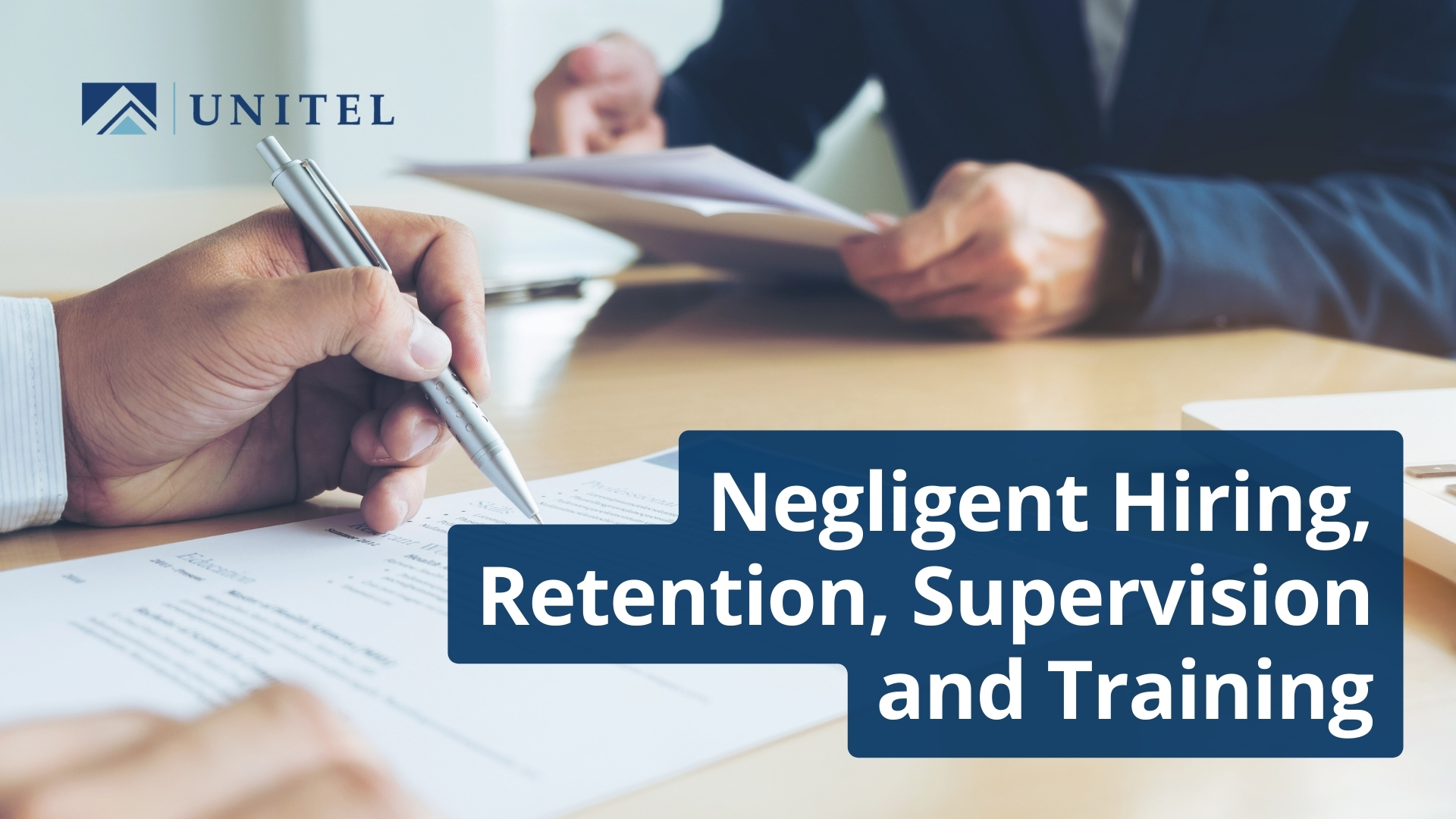Negligence, in regards to employment, is a claim brought by an individual seeking to hold an employer liable for the damages (injury) caused by an employee. Elements for establishing a negligence claim in employment are basically the same as for a standard negligence claim:
- That the employer owed the injured party (plaintiff) a duty of care
- The duty of care was breached by the employer
- The breach caused the injury to the plaintiff
- The injury to the plaintiff was reasonably foreseeable
Negligence actions can generally be broken down into four categories regarding employment:
- Negligent hiring
- Negligent retention
- Negligent supervision
- Negligent training

Negligent Hiring
Employers have a duty to use reasonable care when hiring employees to ensure that they do not hire individuals who may pose a threat of injury to fellow employees, members of the public, or the workplace in general. In many cases, negligent hiring claims stem from acts of violence and sexual assault against co-workers.
When an employer fails to conduct an adequate pre-employment investigation — including, as circumstances warrant, reference checks, post-employment verifications, credit checks, and criminal record checks — that employer risks the potential for negligent hiring liability for injuries caused by a disruptive or violent employee to third parties, such as customers, clients, suppliers, visitors, or others.
While the legal standards vary from state to state, damages may be awarded for actual injuries and for pain and suffering; punitive damages are not uncommon. In addition, under state workers’ compensation laws, employers may be required to compensate victims for on-the-job violence.
Avoiding Negligent Hiring Claims
To help avoid negligent hiring claims, employers should:
- Verify an applicant’s work history. Be alert for long gaps in an applicant’s work history, which may have been for periods of incarceration.
- Attempt to obtain reference information from former employers.
- Increase the scope of the pre-employment investigation when hiring for positions where there is greater risk of harm to the public or to fellow employees.
- Consider criminal record checks in compliance with all applicable state and federal laws. Although some costs are involved, they are insignificant when compared to the potential liability for negligent hiring.
- Document all pre-employment investigatory efforts, including nonproductive contacts with former employers.
- Use effective interviewing techniques. During interviews employers should ask questions, such as:
- “Do you use any illegal drugs?”
- “What is the reason for the gaps in your employment history?”
Note: Employers often use references to gauge the suitability of job applicants. However, companies may restrict the amount of information they provide about a former employee as a result of their concerns about privacy and defamation claims.
Negligent Retention
Negligent retention is a similar claim to negligent hiring. Negligent retention differs from negligent hiring only with respect to when an employer learns, or should have learned, about an employee’s lack of suitability for the job. In negligent retention claims, the failure occurs when an employer continues to retain an unsuitable employee. Failing to take action against an employee known or suspected to pose a risk of harm to co-workers, customers, and others can expose an employer to liability for actual injuries, pain, suffering, and even punitive damages.
An employer may be liable under the negligent retention theory (even where the employer has conducted an extensive investigation into an employee’s background at the time of hire) if, during the course of employment, the employer became aware or should have become aware that the employee was unfit for the job.
Claims of negligent retention often arise where an employer becomes aware of problems with a particular employee but fails to take further action such as investigating, disciplining, discharging, or reassigning the employee. In such cases, the employer has a duty to take appropriate action to protect other employees and the public. This duty is not limited to actions occurring on the employer’s premises.
The Employer Knew or Should Have Known
Negligent retention claims often focus on whether the employer knew or should have known of the employee’s unfitness for duty.
This question is often very fact-specific, but the courts have identified a number of factors that may be relevant to such a determination, as follows:
- The employee’s overall work record.
- Whether the employer had received any complaints about the employee.
- The degree to which the employee’s negative activities were related to the job.
- Whether any managers or supervisors witnessed the alleged negative activities.
Appropriate Employer Action
A second and related issue that often arises in the negligent retention context concerns the nature of appropriate employer action. Even if an employer learns of an employee’s negative activities, the employer will only be held liable for negligent retention if the employer fails to take appropriate action to address the activities.
Appropriate action may include the following:
- Disciplining the employee.
- Removing the employee from a position in which the person could harm other employees or members of the public.
- Exercising closer supervision over the employee.
- Terminating the employee.
Negligent Supervision
The claim of negligent supervision is recognized in a limited number of jurisdictions. Negligent supervision claims are based upon an employer’s failure to reasonably control or monitor the actions of employees.
Negligent supervision claims are brought most often in the context of sexual harassment lawsuits. An employee may allege that poor supervision by the employer of another employee allowed the harassing conduct to continue.
In these circumstances, the success of the negligent supervision claim may depend on the following circumstances:
- Whether the employee/victim reported the harassment to the employer.
- Whether the employer otherwise knew or should have known about the harassment.
- Whether the employer took prompt action to prevent further harassment.
Negligent supervision claims also arise when injuries occur to nonemployees through the conduct of an employee. For an employer to be found liable, courts generally require that the harmful conduct must have occurred on the employer’s property or with something belonging to the employer (for example, an automobile). Courts sometimes examine whether the conduct occurred while the employee was working or on duty.
Thus, a negligent supervision claim might be successful if the employee’s conduct occurred while subject to the supervision or control of the employer. Even then, employers generally must have had some reason to anticipate the harmful conduct by the employee before they may be held liable for failing to prevent the harm through properly supervising the employee.
Claims for negligent supervision are still fairly new in most states, but the number of such claims is likely to grow. A claim that an employer failed to take proper care in supervising its employees fills the gap between a claim for negligent hiring and a negligent retention claim. The best way for an employer to avoid negligent supervision claims is to pay close attention to the conduct of employees after they are hired, to take prompt action if observation indicates that a particular employee may be behaving inappropriately, and to clearly document such actions and observations as they occur.
The success of a claim for negligent supervision or negligent retention may also depend on whether the employee or injured individual has brought claims under the state antidiscrimination laws. Taking advantage of such state law remedies may nullify the employee’s claims for negligence.
Negligent Training
Another more recently seen claim is that of negligent training. Negligent training claims are basically a variant of negligent supervision. Negligent training claims may arise when the employer fails to train or incorrectly trains an employee and the employee ’s actions injure another individual. Negligent training claims are similar to the other negligence claims listed previously. Common negligent training claims include the following:
- The employer failed to properly train and/or educate an employee responsible for securing an employer’s facility or guarding the safety of the employer’s property on how to perform the job safely and effectively.
- The employer failed to provide the necessary knowledge and/or training to an employee in using instruments and equipment necessary to properly perform the job.
Use of Private Investigators
Employers that seek to minimize the likelihood of negligent hiring and negligent retention lawsuits are increasingly relying upon the services of private investigators to help them make prudent hiring decisions. Private investigators depend on computer databases or courthouse records to produce the information they seek.
The following are some of the services that private investigators can perform for employers:
- Confirm or refute a job applicant’s education, professional licenses, and previous employment history.
- Determine if the applicant has been arrested, charged, or convicted of a crime.
- Find out if the applicant was sentenced to jail and if so, how long of a sentence the individual served.
- Uncover any aliases that a job applicant may have used.
- Unearth any judgments or liens that have been filed against the applicant.
- Turn up a job applicant’s credit history, driving record, telephone records, date of birth, home addresses, and addresses of relatives.
Because private investigators are expensive, most companies decide to limit the use to candidates for managerial or upper management positions. Therefore, employers should implement internal measures to reduce their legal liability in the area of negligent hiring. Further, if private investigators are use to perform the services described, these organizations are consumer reporting agencies (as defined by the Fair Credit Reporting Act). If such agencies are utilized the notification, authorization, and disclosure requirements of the act must also be satisfied.
The loss prevention information and advice presented in this document is intended only to advise our clients, customers and business partners of a variety of methods and strategies based on generally accepted safe practices, for controlling potentially loss producing situations commonly occurring in business premises and/or operations. They are not intended to warrant that all potential hazards or conditions have been evaluated or can be controlled. They are not intended as an offer to provide insurance coverage for such conditions or exposures, or to imply that UNITEL Insurance Group will provide such coverage. The liability of UNITEL Insurance Group is limited to the specific terms, limits and conditions of the insurance policies issued, if any.




